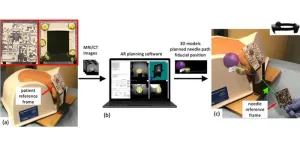(Press-News.org) A good night’s sleep can solve all sorts of problems – but scientists have now discovered new evidence that sleeping well may make you less vulnerable to infection. Scientists at the University of Bergen recruited medical students working in doctors’ surgeries to hand out short questionnaires to patients, asking about sleep quality and recent infections. They found that patients who reported sleeping too little or too much were more likely also to report a recent infection, and patients who experienced chronic sleep problems were more likely to report needing antibiotics.
“Most previous observational studies have looked at the association between sleep and infection in a sample of the general population,” said Dr Ingeborg Forthun, corresponding author of the study published in Frontiers in Psychiatry. “We wanted to assess this association among patients in primary care, where we know that the prevalence of sleep problems is much higher than in the population at large.”
Studying sleep in the doctor’s office
Evidence already exists that sleep problems raise the risk of infection: in a previous study, people deliberately infected with rhinovirus were less likely to catch a cold if they reported healthy sleep. Sleep disturbances are common and treatable, and if a link to infection and a mechanism can be confirmed, it might make it possible to cut down on antibiotic use and protect people against infections before they happen. But experimental studies can’t reproduce real-life circumstances.
Forthun and her colleagues gave medical students a questionnaire and asked them to hand it out to patients in the waiting-rooms of the general practitioners’ surgeries where the students were working. 1,848 surveys were collected across Norway. The surveys asked people to describe their sleep quality — how long they typically sleep, how well they feel they sleep, and when they prefer to sleep — as well as whether they had had any infections or used any antibiotics in the past three months. The survey also contained a scale which identifies cases of chronic insomnia disorder.
Risk of infection raised by a quarter or more
The scientists found that patients who reported sleeping less than six hours a night were 27% more likely to report an infection, while patients sleeping more than nine hours were 44% more likely to report one. Less than six hours’ sleep, or chronic insomnia, also raised the risk that you would need an antibiotic to overcome an infection.
“The higher risk of reporting an infection among patients who reported short or long sleep duration is not that surprising as we know that having an infection can cause both poor sleep and sleepiness,” said Forthun. “But the higher risk of an infection among those with a chronic insomnia disorder indicate that the direction of this relationship also goes in the other direction; poor sleep can make your more susceptible to an infection.”
Although there was some potential for bias in the sense that people’s recall of sleep or recent health issues is not necessarily perfect, and no clinical information was collected from the doctors who subsequently saw the patients, the study design allowed for the collection of data from a large study group experiencing real-world conditions.
“We don’t know why the patients visited their GPs, and it could be that an underlying health problem affects both the risk of poor sleep and risk of infection, but we don’t think this can fully explain our results,” said Forthun.
She continued: “Insomnia is very common among patients in primary care but found to be under-recognized by general practitioners. Increased awareness of the importance of sleep, not only for general well-being, but for patients’ health, is needed both among patients and general practitioners."
END
Sleep too much or too little and you might get sick more, scientists find
A study of nearly 2,000 patients in Norway showed that patients who reported sleeping less than six or more than nine hours had a higher risk of infection.
2023-03-02
ELSE PRESS RELEASES FROM THIS DATE:
Study suggests EHR-focused interventions can significantly reduce unnecessary urine cultures among hospital patients
2023-03-02
Study Suggests EHR-Focused Interventions Can Significantly Reduce Unnecessary Urine Cultures Among Hospital Patients
Initiative highlighted in AJIC provides model for resource-limited institutions to decrease overdiagnosis and overtreatment of asymptomatic bacterial infections
Arlington, Va., March 2, 2023 – Physicians in the largest safety-net hospital system in the United States used two electronic health record (EHR)-focused interventions to significantly reduce inappropriate urine cultures among hospitalized patients. Findings from their study, published in the ...
Edible electronics: How a seaweed second skin could transform health and fitness sensor tech
2023-03-02
Scientists at the University of Sussex have successfully trialed new biodegradable health sensors that could change the way we experience personal healthcare and fitness monitoring technology.
The team at Sussex have developed the new health sensors – such as those worn by runners or patients to monitor heart rate and temperature – using natural elements like rock salt, water and seaweed, combined with graphene. Because they are solely made with ingredients found in nature, the sensors are fully biodegradable, making them more environmentally friendly than commonly used rubber and plastic-based alternatives. Their natural ...
Cocaethylene cardiotoxicity in emergency department patients with acute drug overdose
2023-03-01
Des Plaines, IL — When compared to cocaine exposure alone, cocaine and ethanol exposure in emergency department (ED) patients with acute drug overdose was significantly associated with higher occurrence of cardiac arrest, higher mean lactate concentrations, and lower occurrence of myocardial injury. This is the conclusion of a study titled, Cocaethylene cardiotoxicity in emergency department patients with acute drug overdose published in the February issue of Academic Emergency Medicine (AEM), the peer-reviewed journal of the Society for Academic Emergency ...
Free-hand, real-time needle guidance for prostate cancer diagnosis with augmented reality
2023-03-01
According to the US Centers for Disease Control and Prevention, prostate cancer is the second leading cause of cancer death among men. One of the standard approaches for the diagnosis and treatment of prostate cancer involves transperineal (TP) biopsy. This involves inserting a needle through the perineum wall to collect tissue samples. Current methods for TP biopsy generally include a pre-operation MRI scan and a transrectal ultrasound. These images are then fused together and shown on a monitor to the urologist, who then inserts the needle. The needle insertion can be ...
Special Selection
2023-03-01
A team of global experts has discovered new signals of natural selection in humans.
Led by UC Santa Barbara Tsimane Health and Life History Project co-director Michael Gurven, the team studied two populations living in the Bolivian Amazon rainforest — the Tsimane and the Moseten. Previous studies show that these tropical populations are exposed to many parasites and a variety of pathogens; at the same time, the Tsimane rarely suffer from cardiovascular diseases and dementia. This new research suggests that the Tsimane genome has undergone selection ...
Bronze Age well contents reveal the history of animal resources in Mycenae, Greece
2023-03-01
A large Bronze Age debris deposit in Mycenae, Greece provides important data for understanding the history of animal resources at the site, according to a study published March 1, 2023 in the open-access journal PLOS ONE by Jacqueline Meier of the University of North Florida and colleagues.
Animals were an important source of subsistence and symbolism at the Late Bronze Age site of Mycenae in Greece, as evidenced by their depictions in art and architecture, but more research is needed on the animals ...
What distinguishes fans from celebrity stalkers?
2023-03-01
A survey study of U.S. college students provides new insights into factors associated with the tendency to engage in celebrity stalking behaviors. Maria Wong (Idaho State University, U.S.), Lynn McCutcheon (North American Journal of Psychology, U.S.), Joshua Rodefer (Mercer University, U.S.) and Kenneth Carter (Emory University, U.S.) present these findings in the open-access journal PLOS ONE on March 1, 2023.
Celebrities around the world deal with the threat of unwanted and threatening or intimidating attention or harassment—commonly known as stalking. A growing body of research is exploring and identifying factors that are associated ...
Pregnant Shark birth tracking technology provides key data for species protection
2023-03-01
Most people find sharks threatening. Who doesn’t have an image in their mind of a menacing shark fin racing through the ocean in search of its next meal?
But it is the shark that is threatened.
According to Defenders of Wildlife, a national nonprofit dedicated to protecting imperiled species, 75% of shark species are threatened with extinction and up to 73 million sharks are being killed each year for their fins.
Habitats that were once secure places for sharks to give birth have also been affected. And the fact that sharks have long gestation periods, giving birth ...
Scientists discover how to prevent death of nerve cells in most common forms of MND and dementia
2023-03-01
**Strictly embargoed until 19:00 (GMT) Wednesday 1 March 2023**
Scientists discover how to prevent death of nerve cells in most common forms of MND and dementia
Researchers from the University of Sheffield’s Institute of Translational Neuroscience have discovered how to prevent the death of nerve cells and protect nerves from neurodegeneration in the most common forms of MND and frontotemporal dementia
The researchers used a peptide, a small assembly of amino acids or protein bricks, with a cell-penetrating ...
Obstacles for breast cancer prevention in high-risk Black women
2023-03-01
Black women at high risk of breast cancer face a variety of obstacles that may keep them from care that could prevent cancer and increase the chances they’ll survive if they develop the disease, new research has found.
A study from researchers at The Ohio State University provides insights into the factors that contribute to racial disparities in use of preventive measures, including genetic testing, prophylactic mastectomies and medication to thwart breast cancer.
In the new study, which appears today (March 1, 2023) in the journal PLOS ONE, the ...
LAST 30 PRESS RELEASES:
Pekingese, Shih Tzu and Staffordshire Bull Terrier among twelve dog breeds at risk of serious breathing condition
Selected dog breeds with most breathing trouble identified in new study
Interplay of class and gender may influence social judgments differently between cultures
Pollen counts can be predicted by machine learning models using meteorological data with more than 80% accuracy even a week ahead, for both grass and birch tree pollen, which could be key in effective
Rewriting our understanding of early hominin dispersal to Eurasia
Rising simultaneous wildfire risk compromises international firefighting efforts
Honey bee "dance floors" can be accurately located with a new method, mapping where in the hive forager bees perform waggle dances to signal the location of pollen and nectar for their nestmates
Exercise and nutritional drinks can reduce the need for care in dementia
Michelson Medical Research Foundation awards $750,000 to rising immunology leaders
SfN announces Early Career Policy Ambassadors Class of 2026
Spiritual practices strongly associated with reduced risk for hazardous alcohol and drug use
Novel vaccine protects against C. diff disease and recurrence
An “electrical” circadian clock balances growth between shoots and roots
Largest study of rare skin cancer in Mexican patients shows its more complex than previously thought
Colonists dredged away Sydney’s natural oyster reefs. Now science knows how best to restore them.
Joint and independent associations of gestational diabetes and depression with childhood obesity
Spirituality and harmful or hazardous alcohol and other drug use
New plastic material could solve energy storage challenge, researchers report
Mapping protein production in brain cells yields new insights for brain disease
Exposing a hidden anchor for HIV replication
Can Europe be climate-neutral by 2050? New monitor tracks the pace of the energy transition
Major heart attack study reveals ‘survival paradox’: Frail men at higher risk of death than women despite better treatment
Medicare patients get different stroke care depending on plan, analysis reveals
Polyploidy-induced senescence may drive aging, tissue repair, and cancer risk
Study shows that treating patients with lifestyle medicine may help reduce clinician burnout
Experimental and numerical framework for acoustic streaming prediction in mid-air phased arrays
Ancestral motif enables broad DNA binding by NIN, a master regulator of rhizobial symbiosis
Macrophage immune cells need constant reminders to retain memories of prior infections
Ultra-endurance running may accelerate aging and breakdown of red blood cells
Ancient mind-body practice proven to lower blood pressure in clinical trial
[Press-News.org] Sleep too much or too little and you might get sick more, scientists findA study of nearly 2,000 patients in Norway showed that patients who reported sleeping less than six or more than nine hours had a higher risk of infection.




